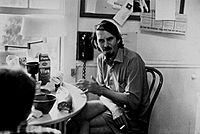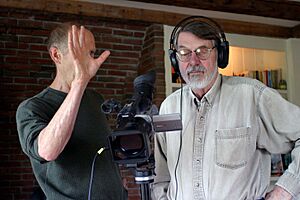Robert Creeley facts for kids
Quick facts for kids
Robert Creeley
|
|
|---|---|

Creeley in 1972
|
|
| Born | May 21, 1926 Arlington, Massachusetts, United States |
| Died | March 30, 2005 (aged 78) Odessa, Texas |
| Resting place | Cambridge, Massachusetts |
| Language | English |
| Nationality | American |
| Education | Holderness School and BA at Black Mountain College |
| Genre | Poetry |
| Literary movement | Modernism, Post-Modernism |
| Notable works | For Love |
| Notable awards | Robert Frost Medal (1987) |
|
|
|
Robert White Creeley (May 21, 1926 – March 30, 2005) was an American poet. He wrote more than sixty books of poetry and prose. He is often linked with the Black Mountain poets. He was good friends with other famous writers. These included Charles Olson, Robert Duncan, and Allen Ginsberg. Creeley taught poetry at the State University of New York at Buffalo. He also taught at Brown University. He received the Lannan Foundation Lifetime Achievement Award.
Contents
Early Life and Education
Robert Creeley was born in Arlington, Massachusetts. He grew up in Acton. He and his sister, Helen, were raised by their mother. When he was two years old, he lost his left eye. He went to the Holderness School in New Hampshire.
In 1943, he started at Harvard University. He left to join the American Field Service. He served in Burma and India during 1944–1945. He returned to Harvard in 1946. Later, he earned his college degree from Black Mountain College in 1955. He also taught some classes there.
A Poet's Journey
After teaching in New Mexico, Creeley visited San Francisco in 1956. He heard about a new wave of poetry there. He met Allen Ginsberg, who had just finished his famous poem Howl. Creeley also became friends with Jack Kerouac. Later, he met the artist Jackson Pollock in New York City.
For a short time, Creeley was a chicken farmer in Littleton, New Hampshire. He started teaching in 1949. He connected with Cid Corman, whose radio show he listened to. Corman invited him to read his poems on the show. This is how Charles Olson first heard about Creeley.
From 1951 to 1955, Creeley lived on the Spanish island of Mallorca. He lived there with his wife, Ann, and their three children. They started a publishing company called Divers Press. They published works by friends like Paul Blackburn and Robert Duncan. Creeley wrote many of his stories and a novel while on the island. He also helped print magazines like Origin there. Printing costs were much lower in Mallorca.
Teaching and Recognition
In 1960, Creeley earned a master's degree from the University of New Mexico. He began teaching at the Albuquerque Academy in 1958. In 1957, he met Bobbie Louise Hawkins. They lived together and had two children, Sarah and Katherine. Creeley dedicated his book For Love to Bobbie.
Creeley read his poems at big events. These included the 1963 Vancouver Poetry Festival. He also read at the 1965 Berkeley Poetry Conference. In 1967, he joined the English faculty at the University at Buffalo. He stayed there until 2003. Then he moved to Brown University. From 1990 to 2003, he lived in Black Rock with his family.
Creeley became famous in 1962 with his poetry book For Love. He won many awards, including the Bollingen Prize. He was named the New York State Poet laureate from 1989 to 1991. In 2003, he became a member of the American Academy of Arts and Sciences.
In his later years, Creeley helped many younger poets. He was very supportive of people, no matter their background. He believed in being helpful to others. He often made strangers feel comfortable when they met him. He even used the internet to stay in touch with friends and poets.
Robert Creeley passed away on March 30, 2005, in Odessa, Texas. He died from problems related to pneumonia. He is buried in Cambridge, Massachusetts.
In 2016, a short film was made about his son, Will Creeley. The film was called "For Will." It shared stories about Robert Creeley's life and his relationship with his son.
His Poetic Style
Robert Creeley was part of a special tradition in American poetry. This tradition included poets like Ezra Pound and Charles Olson. They believed that "form is never more than an extension of content." This means the way a poem looks and sounds should grow naturally from what it's about.
Creeley's first book, Le Fou, came out in 1952. After that, he published a new collection almost every year. His poems often used short lines and stanzas. He sometimes used rhyme, but not in a strict pattern. It was more like rhyme happened when it felt right.
For example, in his poem "The Hero," the lines have a changing number of words. Usually, there are four to six words per line. The poem doesn't have a set rhyme plan. But some lines do rhyme, and it ends with two rhyming lines. All the stanzas in this poem have four lines.
Here are the first two stanzas from "The Hero":
Each voice which was asked
spoke its words, and heard
more than that, the fair question,
the onerous burden of the asking.
And so the hero, the
hero! stepped that gracefully
into his redemption, losing
or gaining life thereby.
Some people thought Creeley wrote in "free verse" (poetry without a set rhythm or rhyme). But his poems often had their own strict rules. They were carefully crafted. Creeley focused on a "personal rhythm" in his poems. He wanted his poems to sound like a person speaking naturally.
As he got older, Creeley's poems sometimes became more like fragments. This showed how he saw life as broken into pieces. He focused on the craft of poetry itself. He didn't often write about big social issues.
In 1979, jazz musician Steve Swallow made an album called Home. It featured poems by Creeley set to music. Creeley later worked with Swallow on three more albums.
Some of Creeley's early works appeared in a magazine called Nomad. After he passed away, more of his work was published. This included the second volume of his Collected Poems in 2006. His selected letters were published in 2014.
Film Appearances
Robert Creeley appeared in several films:
- Creeley (directed by Bruce Jackson and Diane Christian), 1988.
- Poetry in Motion (directed by Ron Mann), 1982.
- Black Mountain Blues (directed by Colin Still of Optic Nerve), 2017.
- "For Will" short (directed by Grayson Goga and Grace Stalley), 2016.
Research Resources
- Faas, Ekbert (1990) Irving Layton and Robert Creeley: The Complete Correspondence 1953-1978. McGill-Queen's University Press.
- Faas, Ekbert (2001) Robert Creeley: A Biography. McGill-Queen's University Press.
See also
 In Spanish: Robert Creeley para niños
In Spanish: Robert Creeley para niños


